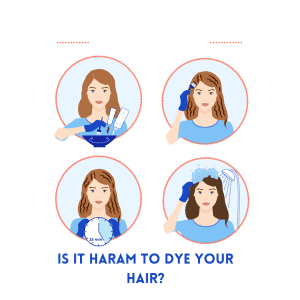Is it haram to dye your hair? In Islam, dyeing your hair is not prohibited. The Prophet (peace be upon him) told his companions that they needed to dye their hair. He’d also use henna to color his beard. On the other hand, scholars discuss which colors and hair coloring components are prohibited. Let’s look at what they are and why they are not permitted.
Is it haram to dye your hair?
The answer to Is it haram to dye your hair? It boils down to:
In Islam, hair dyeing is acceptable as long as pure black is avoided.
It applies to both men and women, depending on what works best for their hair, such as combing, using oils, or coloring to cover grey.
Scholars in the past discussed hair dying using black dye, and most of them advised against it.
Is Bleaching Hair Haram?
The permissibility of bleaching hair is a contentious issue among Muslim academics.
Some people feel it is permitted, while others say it is forbidden.
Scholars who believe bleaching hair is haram quote ‘Abdullah’s narration:
The Prophet (ﷺ) cursed the women who practice tattooing and those who seek to be tattooed, the women who remove hair from their faces seeking beautification by changing the creation of Allah.
The hadith above expressly forbids any permanent alteration of the body for the aim of attractiveness.
Bleaching your hair is considered makruh by particular academics.
This stems from their belief that utilizing any substance that has the potential to hurt someone without a good reason, such as a medical need, is makruh.
As a result, experts argue that because bleach includes hazardous chemicals, it is likewise makruh to use it.
Some academics say that bleaching your hair is okay if you do the following:
- Use bleach that is composed entirely of natural substances.
- Makruh hues should be avoided.
- Some scholars believe bleaching your hair to be halal if these requirements are satisfied
Ruling on hair coloring using current dyes
Allah be praised
The use of hair color falls within the category of customs, and the essential idea is that it is legal.
Based on this, it is permitted to color one’s hair using current dyes and other chemicals, as long as the paint is not black and is not used to conceal grey hair, does not include emulating disbelievers, and is not medically dangerous.
In Shaykh Ibn ‘Uthaymeen’s Fatawa Noor ‘ala ad-Darb (may Allah have compassion on him), it says:
The primary concept in topics other than religious activities is allowed.
Accordingly, a lady may color her hair with any color she desires, except the dye is black and is used to conceal grey hair.
That is not acceptable since the Prophet (peace and blessings of Allah be upon him) advised against concealing grey hair but against wearing black.
And this color should not be used only by unbelieving women, in the sense that if this lady is seen, it may be assumed that she is a skeptical woman since no one else uses it.
It is haraam for the lady to color her hair with it in that situation because the Prophet (peace and blessings of Allah be upon him) said:
“Whoever imitates a people is one of them.”
If the dye is absent of these two aspects – such as black used to conceal grey hair or color used solely by doubting women.
The main idea is that it is permitted, and the lady may color her hair as she pleases.
Shaykh Ibn ‘Uthaymeen’s opinion in Is it haram to dye your hair?
The following questions were posed to Shaykh Ibn ‘Uthaymeen (may Allah pity him):
Is it haram to dye your hair with chemical colors available on the market?
He replied: Changing the color of one’s hair from white to black is not allowed since the Prophet (blessings and peace of Allah be upon him) forbade it.
And the Messenger (blessings and peace of Allah be upon him) issued a solid warning to anybody who dyes his grey hair black.
There is nothing improper with altering the color of one’s hair to any other color because the underlying idea is that things are legal unless proof is provided that they are not.
This is true unless it is done in imitation of disbelieving women, which is prohibited since copying disbelievers is haraam, as the Prophet (peace and blessings of Allah be upon him) said:
“Whoever imitates a people is one of them.”
Furthermore, the questioner emphasized that it is chemical in her question.
Doctors should be consulted to determine whether this dye may affect the hair and scalp.
It is not legal to utilize it if this is confirmed.
And Allah is the most knowledgeable.
Is it permissible to use semi-permanent hair dye in Islam?

Is it haram to dye your hair? Semi-permanent hair colors are typically considered permitted in Islam, according to scholars.
Some scholars debate whether hair coloring is permissible since it prevents simple ablution (wudhu).
Most experts think that transitory colors aren’t obstacles. Hence the ablution is acceptable.
On the other hand, certain hair dyes coat the hair with a layer of coating rather than coloring it momentarily.
Scholars consider wudhu or ghusl invalidated since the covering layer prevents water from reaching the hair.
In any case, when the wudhu is deemed invalid, the prayer is deemed void as well.
As a result, scholars consider the usage of such pigments to be haram.
Is it haram to dye your hair? Use permanent hair dye
According to most academics, permanent hair color is acceptable in Islam under certain situations.
Scholars have differing opinions on the requirements; some believe that wearing alcoholic coloring is halal, while others do not.
However, it’s a good idea to keep an eye on the dye’s nature, namely whether it enables water to infiltrate the scalp.
As a result, the ingredient should not render the ablution ineffective.
Scholars also urge Muslims to be wary of permanent coloring since water may infiltrate the scalp.
If the color establishes a barrier, ablution may be invalid (wudhu).
Furthermore, most scholars believe the use of black dye to be haram.
All other hair colors must be made with pure materials and halal.
As a result, it must be devoid of any impure ingredients, prohibited animal-derived components, and so on.
Join our Quran Courses to learn Quran Arabic and Tajweed online



